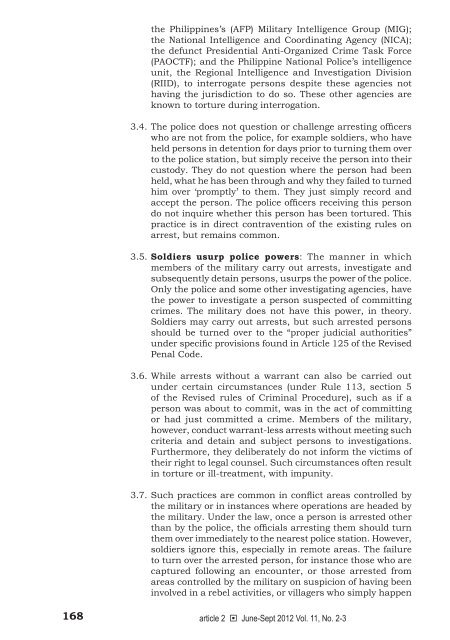Create successful ePaper yourself
Turn your PDF publications into a flip-book with our unique Google optimized e-Paper software.
168<br />
the Philippines’s (AFP) military Intelligence group (mIg);<br />
the national Intelligence and Coordinating Agency (nICA);<br />
the defunct Presidential Anti-Organized Crime Task Force<br />
(PAOCTF); and the Philippine national Police’s intelligence<br />
unit, the Regional Intelligence and Investigation Division<br />
(RIID), to interrogate persons despite these agencies not<br />
having the jurisdiction to do so. These other agencies are<br />
known to torture during interrogation.<br />
3.4. The police does not question or challenge arresting officers<br />
who are not from the police, for example soldiers, who have<br />
held persons in detention for days prior to turning them over<br />
to the police station, but simply receive the person into their<br />
custody. They do not question where the person had been<br />
held, what he has been through and why they failed to turned<br />
him over ‘promptly’ to them. They just simply record and<br />
accept the person. The police officers receiving this person<br />
do not inquire whether this person has been tortured. This<br />
practice is in direct contravention of the existing rules on<br />
arrest, but remains common.<br />
3.5. Soldiers usurp police powers: The manner in which<br />
members of the military carry out arrests, investigate and<br />
subsequently detain persons, usurps the power of the police.<br />
Only the police and some other investigating agencies, have<br />
the power to investigate a person suspected of committing<br />
crimes. The military does not have this power, in theory.<br />
Soldiers may carry out arrests, but such arrested persons<br />
should be turned over to the “proper judicial authorities”<br />
under specific provisions found in Article 125 of the Revised<br />
Penal Code.<br />
3.6. while arrests without a warrant can also be carried out<br />
under certain circumstances (under Rule 113, section 5<br />
of the Revised rules of Criminal Procedure), such as if a<br />
person was about to commit, was in the act of committing<br />
or had just committed a crime. members of the military,<br />
however, conduct warrant-less arrests without meeting such<br />
criteria and detain and subject persons to investigations.<br />
Furthermore, they deliberately do not inform the victims of<br />
their right to legal counsel. Such circumstances often result<br />
in torture or ill-treatment, with impunity.<br />
3.7. Such practices are common in conflict areas controlled by<br />
the military or in instances where operations are headed by<br />
the military. under the law, once a person is arrested other<br />
than by the police, the officials arresting them should turn<br />
them over immediately to the nearest police station. however,<br />
soldiers ignore this, especially in remote areas. The failure<br />
to turn over the arrested person, for instance those who are<br />
captured following an encounter, or those arrested from<br />
areas controlled by the military on suspicion of having been<br />
involved in a rebel activities, or villagers who simply happen<br />
article 2 � June-Sept 2012 Vol. 11, No. 2-3


